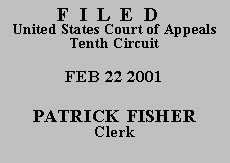

| KARL LEE BROWN, |
|
| v. | |
| GARY GIBSON, Warden, |
determination of this appeal. See Fed. R. App. P. 34(a)(2)(c);10th Cir. R. 34.1(G). The case is therefore ordered submitted without oral argument
Karl L. Brown, a state prisoner proceeding pro se, appeals the district court's dismissal of his habeas petition filed pursuant to 28 U.S.C. § 2254. We agree with the district court's finding that Mr. Brown's petition is untimely and that he has not presented claims for which relief should be granted. Accordingly, we decline to issue a certificate of appealability and dismiss the appeal.
On August 6, 1996, Mr. Brown pleaded guilty to escape from pre-parole, after conviction of two or more felonies, and was sentenced to twenty years' imprisonment. Mr. Brown did not move to withdraw his plea and did not otherwise appeal.
On January 28, 1999, Mr. Brown filed a petition for a writ of habeas corpus in the state district court, which was denied. The Oklahoma Court of Criminal Appeals affirmed the denial of post-conviction relief on May 19, 1999. On October 18, 1999, Mr. Brown filed this action in federal court, claiming (1) he received ineffective assistance of trial counsel; (2) he was placed in double jeopardy; and (3) his due process rights were violated. The district court dismissed his petition as untimely and subsequently denied his application for a certificate of appealability and his motion to proceed in forma pauperis. Before us is a renewed application for a certificate of appealability and a renewed motion to proceed in forma pauperis.
Mr. Brown's conviction became final on August 16,1996, ten days after entry of judgment and sentence. See Okla. Rule 4.2, Rules of the Court of Criminal Appeals (requiring the defendant to file an application to withdraw guilty plea within ten days from the date of the pronouncement of the judgment and sentence in order to commence an appeal from any guilty plea conviction). Absent a tolling event, the one-year limitation period for filing an application for a writ of habeas corpus began to run on August 16, 1996. See 28 U.S.C. § 2244(d)(1). The district court determined that Mr. Brown did not file his application for post-conviction relief in state court until January 28, 1999, long after the one-year period expired. Because Mr. Brown's application for state post-conviction relief was not filed within AEDPA's one-year time limit, the district court correctly determined that the tolling provisions of § 2244(d)(2) were not implicated. Mr. Brown's federal habeas petition was filed on October 18, 1999, more than two years after the August 16, 1997, deadline.
We agree with the conclusions of the district court. We also note that Mr. Brown's brief, which we construe liberally pursuant to Haines v. Kerner, 404 U.S. 519, 520-21 (1972) (per curiam), suggests no basis for equitable tolling, because he has not demonstrated any extraordinary way in which he has been prevented from asserting his rights. See Miller v. Marr, 141 F.3d 976, 978 (10th Cir. 1998) (suggesting equitable tolling of limitation period when delay is encountered due to circumstances over which inmate had no control and inmate diligently pursues claims).
We have thoroughly reviewed the record on appeal, Mr. Brown's brief, and the district court's order. Accordingly, we GRANT his motion to proceed in forma pauperis, DENY his request for a certificate of appealability for substantially the same reasons set forth in the district court's order, and DISMISS the appeal.
Entered for the Court,
Robert H. Henry
Circuit Judge
*. This order and judgment is not binding precedent, except under the doctrines of law of the case, res judicata, and collateral estoppel. The court generally disfavors the citation of orders and judgments; nevertheless, an order and judgment may be cited under the terms and conditions of 10th Cir. R. 36.3.